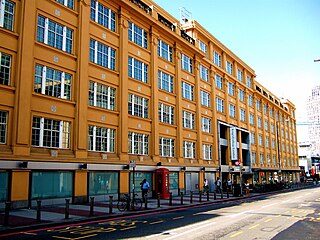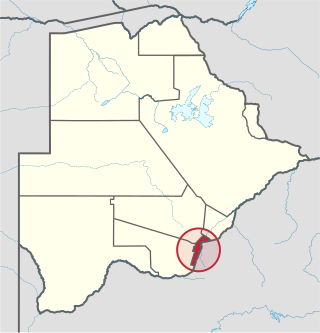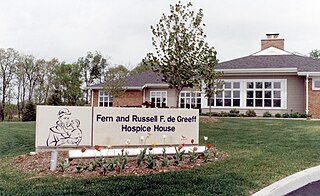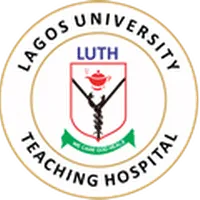
Transportation in Botswana is provided by an extensive network of railways, highways, ferry services and air routes that criss-cross the country. The transport sector in Botswana played an important role in economic growth following its independence in 1966. The country discovered natural resources which allowed it to finance the development of infrastructure, and policy ensured that the transport sector grew at an affordable pace commensurate with demands for services.

Gaborone is the capital and largest city of Botswana with a population of 246,325 based on the 2022 census, about 10% of the total population of Botswana. Its agglomeration is home to 421,907 inhabitants at the 2011 census.
Palliative care is an interdisciplinary medical caregiving approach aimed at optimizing quality of life and mitigating suffering among people with serious, complex, and often terminal illnesses. Within the published literature, many definitions of palliative care exist. The World Health Organization (WHO) describes palliative care as "an approach that improves the quality of life of patients and their families facing the problems associated with life-threatening illness, through the prevention and relief of suffering by means of early identification and impeccable assessment and treatment of pain, illnesses including other problems whether physical, psychosocial, and spiritual". In the past, palliative care was a disease specific approach, but today the WHO takes a broader patient-centered approach that suggests that the principles of palliative care should be applied as early as possible to any chronic and ultimately fatal illness. This shift was important because if a disease-oriented approach is followed, the needs and preferences of the patient are not fully met and aspects of care, such as pain, quality of life, and social support, as well as spiritual and emotional needs, fail to be addressed. Rather, a patient-centered model prioritizes relief of suffering and tailors care to increase the quality of life for terminally ill patients.

The Queen's Medical Centre is a teaching hospital situated in Nottingham, England. Until February 2012, when it was surpassed by the Royal London Hospital, it was the largest hospital in the United Kingdom, though its remains the largest major trauma centre in England. It is managed by Nottingham University Hospitals NHS Trust.
Serowe is an urban village in Botswana's Central District. A trade and commercial centre, it is Botswana's third largest village. Serowe has played an important role in Botswana's history, as capital for the Bamangwato people in the early 20th century and as birthplace of several of Botswana's presidents. More recently it has undergone significant development as the town and as Botswana continues to grow.

The University of Botswana (UB) was established in 1982 as the first institution of higher education in Botswana. The university has three campuses: one in the capital city Gaborone, one in Francistown, and another in Maun. The university is divided into six faculties: Business, Education, Engineering, Humanities, Health Sciences, Science and Social Sciences and the Sir Ketumile Masire Teaching Hospital.

Francistown is the second-largest city in Botswana, with a population of about 103,417 and 147,122 inhabitants for its agglomeration at the 2022 census. It is located in eastern Botswana, about 400 kilometres (250 mi) north-northeast from the capital, Gaborone. Francistown is located at the confluence of the Tati and Ntshe rivers, and near the Shashe River and 90 kilometres (56 mi) from the international border with Zimbabwe.

Education in Botswana is provided by public schools and private schools. Education in Botswana is governed by the Ministries of Basic Education. and Tertiary, Research Science and Technology Among sub-Saharan African countries, Botswana has one of the highest literacy rates. According to The World Factbook - Central Intelligence Agency as of 2015, 88.5% of the population age 15 and over can read and write in Botswana were respectively literate.

The Florence Nightingale Faculty of Nursing, Midwifery & Palliative Care is an academic faculty within King's College London. The faculty is the world's first nursing school to be continuously connected to a fully serving hospital and medical school. Established on 9 July 1860 by Florence Nightingale, the founder of modern nursing, it was a model for many similar training schools through the UK, Commonwealth and other countries for the latter half of the 19th century. It is primarily concerned with the education of people to become nurses and midwives. It also carries out nursing research, continuing professional development and postgraduate programmes. The Faculty forms part of the Waterloo campus on the South Bank of the River Thames and is now one of the largest faculties in the university.

South-East is one of the districts of Botswana. The capital city of Botswana, Gaborone, is surrounded by this district. The administrative capital for the South-East district is the village of Ramotswa. In the southeast, South-East borders the North West Province of South Africa. Domestically, it borders Kgatleng in northeast, Kweneng in northwest, Southern in southwest.
Gabane is a village in Kweneng District of Botswana. It is located 15 km (10 mi) west of Gaborone, the capital of Botswana. The population was 10,399 in 2001 census, making it the fourth largest settlement in Kweneng. Its population was 14,842 at the 2011 census. It's now part of Gaborone agglomeration home to 421,907 inhabitants at the 2011 census.
Otse is a village in the South-East District of Botswana. It is located 60 km south of Gaborone, along the Gaborone–Lobatse road and close to the border with South Africa. This village is home to the Balete people who are related to those in Ramotswa, Gabane and Mogobane. The population was 7,636 in 2011 census.
Metsimotlhabe is a village in Kweneng District of Botswana. The village is located 20 km north-west of Gaborone, along the Gaborone–Molepolole road. The population was 8,884 in 2011 census.

Hospice care is a type of health care that focuses on the palliation of a terminally ill patient's pain and symptoms and attending to their emotional and spiritual needs at the end of life. Hospice care prioritizes comfort and quality of life by reducing pain and suffering. Hospice care provides an alternative to therapies focused on life-prolonging measures that may be arduous, likely to cause more symptoms, or are not aligned with a person's goals.

Lagos University Teaching Hospital (LUTH) is a tertiary hospital established in 1961 and is located in Idi-Araba, Surulere, Lagos State, the administrative division of Nigeria. The teaching hospital affiliated with the University of Lagos College of Medicine established in 1962. The University of Lagos College of Medicine educates students and LUTH provides them with experience through placement and work experience.

Mokgweetsi Eric Keabetswe Masisi is the fifth and current President of Botswana, serving since 2018. He served as the 8th Vice President of Botswana from 12 November 2014 to 1 April 2018. He was a Member of Parliament in the National Assembly for the Moshupa-Manyana constituency from 2009 to 2018.
The Sir Ketumile Masire Teaching Hospital (SKMTH), also known as the University of Botswana Medical School, is the school of medicine of the University of Botswana, Botswana's oldest and largest public university. The medical school was established in 2009. The school provides medical education at undergraduate, and postgraduate levels.
Botswana saw the beginning of the COVID-19 pandemic in 2020. Lockdowns were implemented between March and May, and restrictions continued throughout the year. The previous year's general election was disputed by the opposition, and several cases were filed to overturn the results. Tensions rose with South Africa in 2020 as Botswana sought the prosecution of Bridgette Radebe. Concerns regarding wildlife conservation increased in 2020 as elephants began dying off in large numbers, as well as similar concerns about vultures. Armed conflicts with poachers continued throughout the year, including the killing of four men in November that caused protests in Namibia.
Ministry of Health is a ministry of the Government of Botswana. Its stated aim is to promote and manage health and ensure environmental concerns are considered in all aspects of national development.










